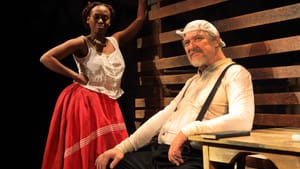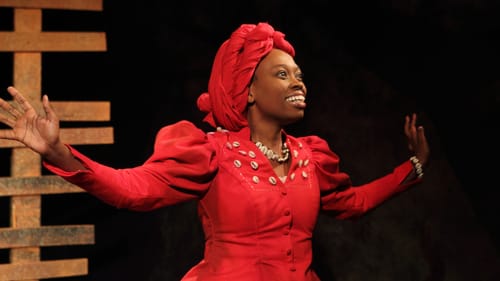Stay in the Loop
BSR publishes on a weekly schedule, with an email newsletter every Wednesday and Thursday morning. There’s no paywall, and subscribing is always free.
O'Neill on the Eastern Cape
EgoPo Classic Theater and Abrahamse and Meyer Productions present 'Desire Under the Elms'

EgoPo Classic Theater begins its season-long exploration of South African theater by importing Desire Under the Elms from Cape Town’s Abrahamse and Meyer Productions. Unfortunately, in this staging, a crucial element of Eugene O’Neill’s early-career melodrama gets lost in translation.
O’Neill set his play in 1850s New England, on a rocky, barren farm whose worth lies more in its personal history than its soil. Ephraim Cabot (Robin Smith) has married the landowner’s daughter and inherited the deed. His son, Eben (Marcel Meyer), blames Ephraim’s hard ways for his mother’s death and dreams of one day being master of the land.
Succession plans are complicated by the arrival of Abbie (Mbali Bloom), Ephraim’s new young wife. O’Neill envisioned Abbie as a shrewd gold-digger, an impoverished woman who smelled opportunity and married a repulsive old man to get her earthly reward. Much of the play’s action lies in a combustible love triangle between father, son, and stepmother.
Continental divide
Director Fred Abrahamse adds a new layer to the story, transporting its setting to rural South Africa around the turn of the last century. Ephraim and Eben become members of a white upper class, while Abbie is Xhosa, an indigenous ethnic group from the Eastern Cape. His adaptation excises the minor characters of Simeon and Peter, Ephraim’s older sons, and focuses the action squarely on the dangerous ménage á trois at the play’s center.
In theory, this concept should work. O’Neill’s racial politics are certainly dubious by the standards of any day — take a look at The Emperor Jones — but he possessed a keen awareness of class consciousness, and that component would seemingly blossom under these circumstances. The combination of foreign interlopers and a native woman, a color-based caste system that inflicts poverty and desperation, and the politics of interracial marriage in an unequal landscape offer a scenario rife with drama.
Abrahamse does little to realize these possibilities, playing the text relatively straight — a standard production with different accents. The only nods to Abbie’s differing background come through her first costume (designed by Meyer) — a vibrant red dress embroidered with cowrie shells, along with matching head wrap — and the insertion of a scene where she performs a tribal ritual to draw Eben to her. Given the lack of introspection around Abbie’s divergent cultural practices, this choice feels cheap, exoticizing her without providing context.

Losing tension
A greater problem comes in the presentation of O’Neill’s ornate language, which lends itself to soliloquizing and ham-fisted delivery. (Read the original text and I promise you’ll have a headache by the third scene).
The monologues can work, though, if staged in a way that suggests characters speaking to each other, pouring out their souls in rare unguarded moments. For example: Abbie’s confession of her questionable past to Eben, or Ephraim’s rhapsodic desire to have one more son before he dies.
In this production, however, the characters speak past each other, causing the supposedly tense bonds between them to fizzle. I suspect the demands of projecting into Drexel University’s cavernous Mandell Theater help matters little, as all three actors take to grandstanding and shouting their lines. A pinch of subtlety would go a long way, although Bloom occasionally lands on a quiet, introspective moment that communicates Abbie’s motives to the audience.
Abrahamse’s simple lean-to set gets dwarfed by the deep, wide dimensions of the Mandell stage, and transitions between scenes stretch far too long, prompting awkward shifting and rustling among audience members. Charl-Johan Lingenfelder’s heavyhanded musical soundscape underscores dramatic moments a bit too strongly, as though lifted from a television detective show.
The impetus to transport “America’s Shakespeare” to the Eastern Cape makes some sense, but as EgoPo’s season progresses, I hope to hear more of the authentic voice of South Africa through the works of its native playwrights.
What, When, Where
Desire Under the Elms. By Eugene O’Neill, Fred Abrahamse directed. EgoPo Classic Theater and Abrahamse and Meyer Productions. Through October 7, 2018, at Drexel University’s Mandell Theater, 3320 Chestnut Street, Philadelphia. (267) 273-1414 or egopo.org.
Sign up for our newsletter
All of the week's new articles, all in one place. Sign up for the free weekly BSR newsletters, and don't miss a conversation.
 Cameron Kelsall
Cameron Kelsall